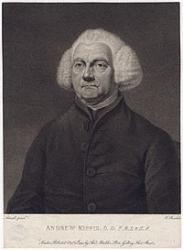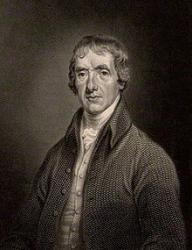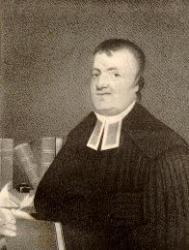Planning worship?
Check out our sister site, ZeteoSearch.org,
for 20+ additional resources related to your search.
- |
User Links
Person Results
‹ Return to hymnal



Export as CSV
Thomas Jervis
1748 - 1833 Hymnal Number: d9 Author of "God, to correct a [the] guilty world" in Sacred Poetry Jervis, Thomas, son of a Presbyterian Minister of the same name, was born at Ipswich in 1748, and educated for the Ministry at Hoxton. In 1770 he was appointed classical and mathematical tutor at the Exeter Academy. From 1772 to 1783 he was tutor to the sons of the Earl of Shelburne, at Bowood, where Dr. Priestley was librarian. In the latter year Jervis succeeded Dr. A. Rees at St. Thomas's Southwark, moving in 1796, after the death of Dr. Kippis, to the Princes' St. Chapel, Westminster. From 1808 to 1818 he was minister at the Mill Hill Chapel, Leeds. After his retirement he lived in the neighbourhood of London, and died there in 1833. Jervis was one of the four editors of A Collection of Hymns & Psalms for Public & Private Worship, London, 1795. He contributed 17 hymns to the 1st ed., and 4 to its Supplement, 1807. Of these several are found in later Unitarian collections in Great Britain and America, including:—
1. God to correct a guilty world. Divine Providence.
2. Great God, Thine attributes divine. Confidence in God.
3. Lord of the world's majestic frame. Praise a Duty.
4. Shall I forsake that heavenly Friend? Constancy desired.
5. Sweet is the friendly voice which [that] speaks. Peace to the Penitent.
6. Thou, Lord, in mercy wilt regard. Penitence.
7. With sacred joy we lift our eyes. Divine Worship. This is given in Laudes Domini, N.Y., 1884, as: "With joy we lift our eyes."
These hymns all date from 1795, and the most popular are Nos. 4 and 6. [Rev. Valentine D. Davis, B.A.]
--John Julian, Dictionary of Hymnology (1907)
Thomas Jervis
Jacob Kimball
1761 - 1826 Hymnal Number: aLXVd Author of "Thy praise, O God, in Zion waits" in Sacred Poetry Kimball, Jacob. (Topsfield, Massachusetts, February 15, 1761--July 24, 1826, Topsfield). He graduated from Harvard in 1780, studied law, taught school, and tried to make a living at various other occupations, with small success except in the field of music where he was regarded as an outstanding singer, teacher, and composer of his period. He edited Rural Harmony (Boston, 1793) which he followed with Essex Harmony (1800), and Essex Harmony, Part II (1802), which included the only tunes of his own composition which can now be identified as his, except those in the popular Village Harmony (1795) the later editions of which, down to 1821, were probably edited by him. There is evidence that he also wrote poetry, including a number of hymns, some of them perhaps anonymous ones, otherwise unknown, included in the above-mentioned song books. The one hymn which can be attributed to him with assurance is his excellent metrical version of Psalm 65 which Jeremy Belknap included in his Sacred Psalmody (1795), entitled "A New Version" and beginning "Thy praise, O God, in Zion waits." The only other hymn by an American author in Belknap's collection is Mather Byles' "When wild confusion wrecks the air," republished in 1760.
See: Jacob Kimball: A Pioneer American Musician, Essex Institution Historical Collections, XCII, no. 4.
--Henry Wilder Foote, DNAH Archives
Jacob Kimball
John Patrick
1632 - 1695 Person Name: Patrick Hymnal Number: aH.CXCVII Author of "O God, we praise thee and confess" in Sacred Poetry John Patrick, a brother of Bishop Simon Patrick, was Prebendary of Peterborough, 1685; Precentor of Chichester, 1690; and preacher at the Charter-House, in the Chapel of which he was buried on his death, in 1695. His "Psalms of David, in Metre," were much used by Presbyterians and Independents until superseded by the compositions of Watts.
----Annotations of the Hymnal, Charles Hutchins, M.A. 1872.
John Patrick
William Enfield
1741 - 1797 Person Name: W. Enfield Hymnal Number: d28 Author of "Wherefore should man, frail child of clay" in Sacred Poetry Enfield, William , LL.D., born at Sudbury, Suffolk, March 29, 1741, of poor parents. Through the assistance of Mr. Hextall, the local Dissenting Minister, at 17 he entered the Daventry Academy under Dr. Ashworth. His first pastorate was of the congregation at Benn's Garden, Liverpool, to which he ministered from 1763 to 1770. In conjunction with Rev. J. Brekell of Key St. chapel, he edited
A New Collection of Psalms proper for Christian Worship, in three parts. I. Psalms of David, &c. II. Psalms of Praise to God. III. Psalms on various Subjects. Liverpool. Printed in the year 1764. Known as the Liverpool Old Collection; Later eds., 1767, 1770, 1787. In this last, 60 more hymns are added to the 3rd part.
From 1770 to 1785 Enfield was at Warrington, as minister to the Old Presbyterian congregation, and as teacher of Belles-lettres and other subjects, in the Dissenting Academy founded there in 1757. He published in 1774, The Speaker; 1783, Institutes of Natural Philosophy, and other works, including:—
Hymns for Public Worship: selected from Various Authors, and intended as a supplement to Dr. Watts’s Psalms. Warrington. Printed for the Editor, 1772. 3rd ed. 1789. London. Printed for J. Johnson, St. Paul's Churchyard, and W. Kyres, Warrington. Contains 160 hymns, rather more than half being the same as in the Liverpool Collection. In this Collection some of Mrs. Barbauld’s hymns appeared for the first time.
From Warrington he proceeded to Norwich as pastor of the Octagon chapel, and died there Nov. 3, 1797. In 1791 he published an abridgment of Brucker's History of Philosophy , and at the time of his death was engaged with Dr. J. Aikin, son of his late colleague at the Warrington Academy, in bringing out a General Biographical Dictionar , vol. i. 1796. He also published A Selection of Hymns for Social Worship. Norwich. Printed by J. March for J. Johnson, St. Paul's Church¬yard, London, 1795. 2nd ed., 1797 ; 3rd ed., 1802. Lon-don, J. Johnson. Printed by W. Eyres, Horse Market, Warrington. Contains 232 hymns, more than half by Watts, and of the rest 93 were retained from the Warrington Collection.
In this Collection Enfield's own hymns first appeared, “Behold where in a mortal form" (Example of Christ); "Wherefore should man, frail child of clay" (Humility); and "O Thou, through all thy works adored" (God the Ruler of Nature). They are characteristic of the "moral preacher" and the Unitarian, and in taste are unexceptionable. Dr. Enfield received his degree from Edinburgh University. On his death Johnson brought out 3 volumes of his Sermons "on Practical Subjects,” with a Memoir by Dr. Aikin. [Rev. Valentine D. Davis, B.A.]
-- John Julian, Dictionary of Hymnology (1907)
William Enfield
Andrew Kippis

1725 - 1795 Hymnal Number: aH.CCI Author of "On thee, each morning, O my God, My waking thoughts attend" in Sacred Poetry Kippis, Andrew, D.D., was born at Nottingham, March 28,1725, and educated for the ministry under Dr. Doddridge at Northampton, 1741-46. After a short residence with congregations at Boston and Dorking, he settled in London in 1753, as minister of the Princes Street Chapel, Westminster. There lie remained till his death in 1795, holding rank as the leading Presbyterian minister in the metropolis. For many years he was classical tutor at the Hoxton Academy, and afterwards at the Hackney College. He contributed largely to the Gentleman's Magazine and the Monthly Review, and edited five volumes of a new edition of the Biographia Britannica, a work commenced in 1778, and interrupted by his death on Oct. 8, 1795. His Life of Captain Cook was also published separately, and to his edition of Lardner's Works (1788) a Memoir was prefixed. His degree of D.D. was con¬ferred by the University of Edinburgh in 1767.
He was joint editor of A Collection of Hymns and Psalms for Public and Private Worship, selected and prepared by Andrew Kippis, D.D., &c. ; Abraham Rees, D.D., &c.; Rev. Thomas Jervis, and Rev. Thomas Mor¬gan, LL.D., London, 1795. This collection, commonly known as Kippis's, but sometimes as Kees's, passed through many editions, a Supplement being added in 1807, and was very generally used during the early decades of this century by congregations of Presbyterians and others, then become Unitarian in London and throughout the country [Unitarian Hymnody, § 9]. It contained 690 hymns.
The aim of the editors in their selection was to avoid “everything of a doubtful or disputable kind," and they adopt the language of Dr. Watts in the preface to his Hymns, "The contentious and distinguishing word of sects and parties are excluded." The alterations and omissions to adapt various hymns to the standard of the editors are considerable, though very little compared to what was done by others before and after them. The tone of the collection is somewhat colourless, and it gradually gave place among Unitarians to others which contained fuller and more varied expression of distinctively Christian feeling.
Two hymns by Kippis appear in this Collection.
1. Great God, in vain man's narrow view, The Incomprehensibility of God, which was generally adopted in later Unitarian books, and appears in Martineau's Hymns, 1840 and 1873.
2. How rich thy gifts, Almighty King, National Thanksgiving, which is four stanzas of the hymn, "Say, should we search the globe around," written for the thanksgiving appointed Nov. 29,1759, and appended to his Sermon on that occasion. It was given in full in Pope's Collection, 1760; and the Liverpool Octagon Collection, 1763. In Lindsey's Collection, 1774, five stanzas are given; in other early books only four, as in Kippis. The last two stanzas, somewhat altered, appear anonymously as: "With grateful hearts, with joyful tongues," in the Congregational Hymn Book, 1836, and the New Congregational Hymn Book, 1859.
[Rev. Valentine. D. David, M.A.]
--John Julian, Dictionary of Hymnology (1907)
Andrew Kippis
John Aikin

1747 - 1822 Hymnal Number: d30 Author of "While sounds of war are heard around" in Sacred Poetry Aikin, John, M.D., 1747-1822. The brother of Mrs. Barbauld,son or Dr. Aikin of the Warrington Academy. As a physician he practised at Warrington and Yarmouth, and from 1798 till the time of his death lived at Stoke Newington. Author (with his sister), of Evenings at Home, editor of the General Biographical Dictionary, and for some time of the Monthly Magazine. His hymn In time of war, "While [what] sounds of war are heard around," was very popular. It is in Kippis and Martineau’s Hymns for the Christian Church and Home.
--John Julian, Dictionary of Hymnology (1907)
John Aikin
Jeremy Belknap

1744 - 1798 Editor of "" in Sacred Poetry Belknap, Jeremy. (Boston, Massachusetts, June 4, 1744--June 20, 1798, Boston). He graduated from Harvard College in 1762; taught school for four years; in 1766 accepted a position as assistant to Rev. Jonathan Cushing of Dover, New Hampshire, and in 1767 was ordained, serving in that parish until 1786. In 1787 he became minister of the Federal Street Church (now the Arlington Street Church), Boston, which he served until his death. Harvard gave him the honorary degree of Doctor of Divinity in 1792. He was the author of a three-volume History of New Hapmshire; of a petition (1788) for the abolition of the slave trade; and of other books and essays; and formed the plan for the Massachusetts Historical Society, organized in 1791. He wrote no hymns but made an important contribution to American hymnody in his collection Sacred Poetry: consisting of Psalms and Hymns adapted to Christian devotion in public and private. Selected from the best authors, with variations and additions (Boston, 1795), which ran to many editions. His intention was to provide a book acceptable to both the conservative and the liberal wings of Congregationalism, to bridge the widening gap which resulted in the formation of the Unitarian denomination a generation later. In this he failed, for only the liberal churches accepted it, though it was widely used by them for 40 years, being much of the best of the period. It includes 300 hymns from the best English sources, and was the first to introduce to Americans the hymns by Anne Steele. The only American hymns in the collection are Jacob Kimball's metrical version of Psalm 65 and Mather Byles' "When wild confusion rends the air."
--Henry Wilder Foote, DNAH Archives
Jeremy Belknap
John Scott
Person Name: Scott Hymnal Number: aH.LXXXII Author of "Great Author of all nature's frame" in Sacred Poetry
John Scott
Mrs. Carter
Person Name: Carter Hymnal Number: aCXXXIXe Author of "Thou God, by whose command I live" in Sacred Poetry
Mrs. Carter
Edward Young
1683 - 1765 Hymnal Number: aH.CCII Author of "O resignation, heavenly power" in Sacred Poetry bapt. July 3, 1683, Upham, Hampshire, Eng.--d. April 5, 1765, Welwyn, Hertfordshire), English poet, dramatist, and literary critic
LOC Name Authority File
Edward Young
William Vincent
1739 - 1815 Person Name: Vincent Hymnal Number: aCIVe Author of "Bless God, O my soul, rejoice in his name" in Sacred Poetry b. 1739, London, England; d. 1815, Westminster, England
Except for his years at Trinity College in Cambridge, Vincent spent most of his life in Westminster, first as a student at Westminster School, then as teacher and headmaster, and finally as dean. He was also the rector of St.
John’s, and later of Islip, as well as sub-almoner to the king. Besides many of his sermons, his diverse publications include writings on public education, parochial music, Greek verbs, and ancient geography and commerce.
William Vincent


 My Starred Hymns
My Starred Hymns


